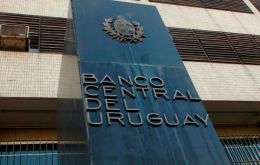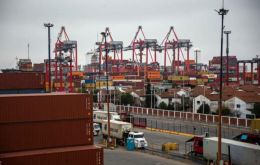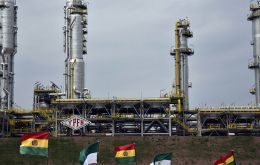MercoPress. South Atlantic News Agency
Tag: economy growth
-
Thursday, October 13th 2022 - 21:07 UTC
Uruguayan Economy minister highlights the importance of climate actions

During her appearance in Washington DC at the Center for Global Development (CGD), Uruguay's Economy Minister Azucena Arbeleche Thursday highlighted the importance of inclusive and sustainable growth.
-
Saturday, September 17th 2022 - 10:15 UTC
Uruguay's economy grows 7.7% in second quarter of 2022

In its National Accounts report published Friday, the Central Bank of Uruguay (BCU) announced that the country's economy had grown 7.7% in the second quarter of 2022 “mainly due to the high yields achieved in the soybean harvest.”
-
Thursday, March 24th 2022 - 09:31 UTC
Uruguay's economy grows 4.4% in 2021, Central Bank says

According to a study by Uruguay's Central Bank released Wednesday, the country's economy has grown 4.4% in 2021, despite all COVID-19 restrictions. The new figures show a recovery from 2020's fall due to the sanitary measures in force, which led to a decline in GDP of 5.9%.
-
Tuesday, March 8th 2022 - 09:36 UTC
Brazilian economy expanded 4,6% in 2021, despite a 0,2% contraction of agriculture

Contrary to foreign forecasts from multilateral organizations forecasts, Brazil’s Gross Domestic Product (GDP) ended 2021 with a 4.6% growth, totaling 8.7 trillion (about US$ 1,7 trillion at the current rate). The country managed to recover from the slowdown of 2020 when the Brazilian economy shrank 3.9% because of the pandemic.
-
Thursday, January 13th 2022 - 09:59 UTC
Latin America forecasted to grow a soft 2,6% in 2022 and 2,7% in 2023, World Bank

Growth in Latin America and the Caribbean region (LAC) rebounded to an estimated 6.7% in 2021, driven by favorable external conditions and pandemic-related developments, according to the World Bank's Global Economic Prospects. Region-wide new COVID-19 cases dropped sharply in the second half of the year, before surging in late December, even as the vaccination rollout progressed. Strong demand in key export destinations (the United States and China), high commodity prices, and continued high remittances to Central American and Caribbean countries were also supportive of growth in 2021.
-
Thursday, January 13th 2022 - 09:45 UTC
ECLAC foresees growth rate in 2022 around one third of that of 2021

Growth in Latin America and the Caribbean will slow down in 2022 to 2.1%, after a 6.2% increase on average last year, the Economic Commission for Latin America and the Caribbean (ECLAC) forecast Wednesday in a study.
-
Friday, December 31st 2021 - 09:22 UTC
Brazil's Industry Confederation expects 1,2% to 1,8% GDP growth in 2022

Brazil's GDP is forecasted to expand by 1,2% in 2022, according to the Brazilian National Industry Confederation (CNI). However since 2022 is an election year and public opinion is strongly divided, the estimate is simply that, an estimate, following on a reasonably dynamic 4,7% growth this year with record exports.
-
Friday, July 2nd 2021 - 09:20 UTC
Chile's economy grows 18.1% thanks to pension withdrawals and state emergency funding

Chile's Central Bank Thursday reported an 18.1% economic growth in May, which has brought it back to the pace of prepandemic levels.
-
Wednesday, May 26th 2021 - 08:30 UTC
Bolivia's economy grows 5.3% in between January and April 2021

Economic activity in Bolivia has grown 5.3% from January to April 2021, according to The Global Index of Economic Activity (IGAE), Economy Minister Marcelo Montenegro announced Tuesday.
-
Tuesday, March 16th 2021 - 09:53 UTC
Argentina industrial output forecasted to increase 6% this year over 2020

Argentina's Ministry of Development and Production anticipated that the country's industrial output should grow more than 6% this year compared to 2020. Economist Matias Kulfas said he expected Argentina's economy as a whole to expand 5% to 6% during the year, based on preliminary data and depending on how the novel coronavirus and vaccination campaign evolves and its impact on growth.
